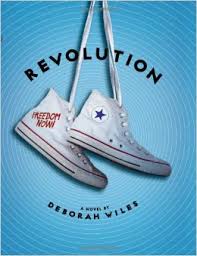Wiles, Deborah. Revolution (The Sixties Trilogy, Book 2). New York: Scholastic Press, 2014. 978-0-545-10607-8. 509p. $19.99. Gr. 5-9.
It’s summer 1964; the Beatles have invaded; troops are heading to Vietnam; the Civil Rights movement is in full force, and Sunny Robinson is a twelve-year-old ready to enjoy a summer of freedom. With her step-brother, Gillette, in tow, Sunny’s summer is turned upside down before it even begins when they witness a black boy, Ray Bullis, swimming in the “white” pool. Soon Freedom Summer takes hold in Greenwood, Mississippi, and the northern Freedom Riders begin establishing schools, registering blacks to vote, desegregating the town, and turning a once quaint, southern town into a place of violence, hatred, and distrust. As Sunny deals with her own family issues, she is thrust into national politics on race, segregation, and war. Told through alternating narrators (the tint of the pages change as the narration alternates between Sunny and Ray), Revolution, is a beautiful story of growth and understanding during the tumultuous summer of 1964, Freedom Summer. Similar to Countdown, Book One of The Sixties Trilogy, Wiles again integrates the stories of maturation during a time of tumultuous national and world affairs with pictures, transcripts, quotes, and propaganda from the 1960s, while connecting the novels through Jo Ellen Chapman, Franny’s older sister from Countdown, one of the volunteers who comes to Greenwood, MS, and interacts with Ray and Sunny.
Revolution skillfully weaves together the stories of Sunny and Ray as they mature throughout Freedom Summer with the growth of our nation as it questioned the validity of segregation, Jim Crow Laws, war in Vietnam, voting rights, education, and social issues for all, not just white citizens. The connectedness of the white and black experience through children is flawless, while maintaining accuracy and a mature understanding of what is happening around them in Greenwood, and throughout the southern United States as Freedom Summer takes hold. The harsh reality of 1964 is not overlooked because of the age of the narrators, but instead is intensified because of their innocence (this is similar to the narration by Scout in To Kill a Mockingbird). This is a perfect historical fiction novel for middle school and high school students not only because of the quality of the story and writing but because of the integration of photographs, transcripts, personal stories, and quotes that add to the experience of this novel and a better understanding of Freedom Summer.
Historical Fiction (1964) Erin Parkinson, Lincoln JSHS, Ellwood City

